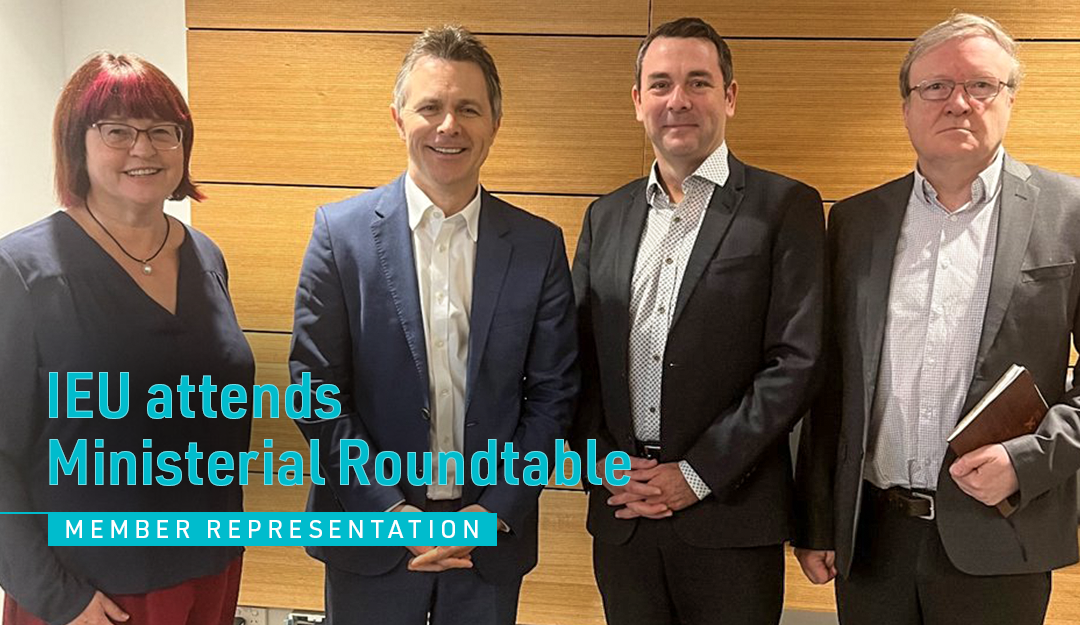IEU attends Teacher Workforce Roundtable

The IEU were invited to Canberra early August to join federal Education Minister Jason Clare and federal Early Childhood Education Minister Anne Aly, along with Education Ministers from all states and territories, for a ‘Teacher Workforce Roundtable’, focused on tackling the nationwide teacher shortage.
The roundtable included principals, teachers, education experts and education unions.
Also invited to present first at the roundtable was an IEU NSW/ACT member; a primary-preschool level classroom teacher. The presentation set the tone for the ensuing roundtable.
Teacher Workforce Shortages
Key issues discussed and solutions argued for on Teacher Workforce Shortages include:
- The matter of workload was the major factor discussed at the meeting as it underpinned the success/failure of all other initiatives.
- The issue of quality in quality initial teacher programs was challenged and we raised concerns on stop gap quick fixes.
- Rushing into new models of programs without reviews and ‘throwing money at untested solutions’ that we may find down the track doing more damage to an already overstretched system and teachers.
- Lack of understanding of the need for teacher mentoring. The IEU called for appropriate resourcing for teachers to be able to mentor ITE students.
- Well-being of school leaders and classroom teachers was not included in the issues paper – the IEU called for strategies to support them.
- The IEU highlighted the strong disconnect between federal initiatives and classroom teachers: “every national initiative ends up being carried on the shoulders of classroom teachers”.
- The IEU called for architecture which addressed and resourced the workload issues, instead of NPIs that put pressure on teachers proving their professionalism – annually. Quality and professionalism is already there. We don’t need to continually prove it. There are mechanisms to address performance issues.
- The IEU challenged the concept of a national campaign of raising and promoting teachers without repairing the fractured foundations on which they are working.
These key issues were roundly supported in the room and Minister Clare acknowledged these points and referred to them many times in responses.
Further meetings at a federal and state level are planned with the National Teacher Workforce Action Plan to be delivered by December 2022 and this will include actions in the following priority areas:
- Elevating the profession.
- Improving teacher supply.
- Strengthening initial teacher education.
- Maximising the time to teach.
- Better understanding future teacher workforce needs.
The Minister commenced the meeting informing everyone that the language to describe this sector was ‘Early Childhood Education and Learning’ and she has informed ‘her colleagues’ and instructed the department.
It is important that a Federal Government Minister value Early Childhood Education as it is vital to a child’s learning and development. Commentary from the previous federal government often limited ECE to simply an economic mechanism to support workplace participation in the community.
Early Childhood Education
Key issues discussed and solutions argued for on Early Childhood Education include:
- The need for a guaranteed and consistent funding stream for the sector which would deliver and safeguard pay and conditions equitable to those received in schools.
- Industrial relations bargaining system – the sector must have access to a less adversarial mechanism to negotiate wages and conditions. The current bargaining laws are ill suited to the sector and are failing ECE staff and employers.
- Concerns that the notion of a public campaign to raise the value of early childhood education without fixing the foundational issue of pay and condition parity and funding and bargaining would be patronising and meaningless.
Commitment was given at the meeting to present these issues to the Job and Skills Summit with the push that ECE had its own workforce issues – and it didn’t simply exist to support the general workforce.
Future meetings will be held to develop an ECE action plan.

